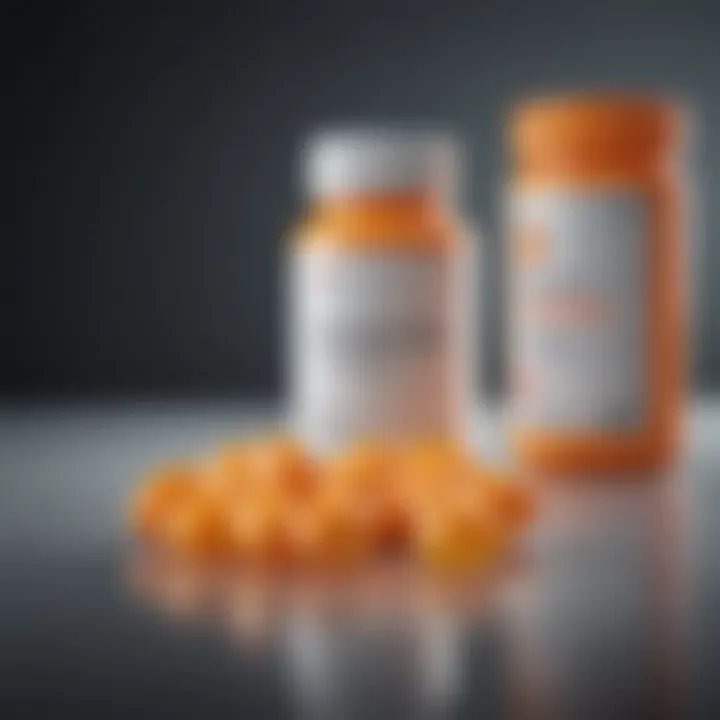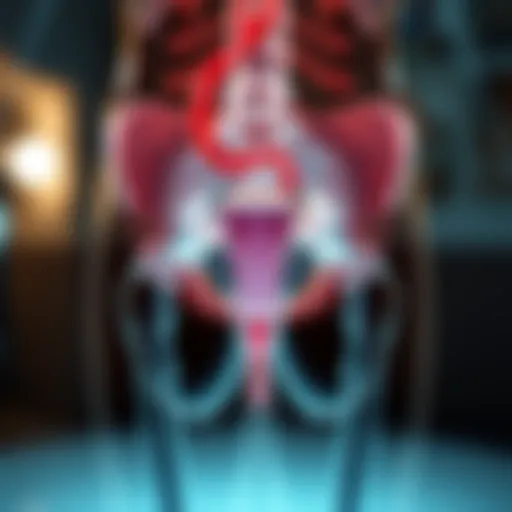Do Vitamin C Tablets Alleviate Hangover Symptoms?


Summary of Objectives
This article aims to delve into the effects of vitamin C tablets on hangover symptoms. It scrutinizes how vitamin C could potentially aid in recovery after excessive alcohol consumption. Understanding the biochemical pathways involved in this process is crucial.
Importance of the Research
Evaluating the efficacy of vitamin C in alleviating hangover effects is particularly pertinent in today's society, where alcohol consumption remains prevalent. This research could provide insights into nutritional strategies to minimize the discomfort associated with hangovers.
Intro
The phenomenon of hangovers is well recognized yet poorly understood. Excess consumption of alcohol often triggers a variety of unpleasant symptoms, such as headaches, fatigue, and gastrointestinal distress. Despite a plethora of anecdotal remedies, scientific evaluation of these methods often remains sparse. Vitamin C tablets frequently enter the discussion as a potential solution due to their reputation for boosting the immune system and enhancing recovery.
Relevance of Vitamin
Vitamin C is known for its role in maintaining overall health. It promotes collagen synthesis, acts as an antioxidant, and assists in important biochemical reactions in the body. When individuals consume alcohol, the body faces oxidative stress and nutrient depletion. This brings into question whether an increase in vitamin C intake could rectify some of these imbalances, ultimately leading to a reduction in hangover symptoms.
Results and Discussion
Presentation of Findings
Several studies have investigated the relationship between vitamin C and alcohol metabolism. One notable study suggested that vitamin C might aid in the breakdown of acetaldehyde, a toxic byproduct of alcohol. However, findings are often mixed. Some research indicates marginal benefits, while other studies find no significant effect on the severity of hangover symptoms.
Implications of Results
Understanding whether vitamin C can effectively address hangover symptoms is vital for public health. If shown to be beneficial, it could encourage a more nutritional approach to recovery after drinking. This will not only enhance individual wellness but also highlight the necessity of maintaining a balanced diet while managing alcohol consumption.
"Ensuring adequate intake of vitamins and minerals is essential for overall well-being, especially post-alcohol consumption."
Preamble
The exploration of vitamin C's role in alleviating hangover symptoms holds significance for various individuals, particularly those who frequently consume alcohol. A hangover results from a complex interplay of biochemical processes and lifestyle choices that can lead to notable discomfort. Understanding this topic is pertinent as it addresses a common social occurrence and the potential for dietary interventions to mitigate its effects.
Vitamin C, known for its antioxidant properties, is often assumed to serve as a remedy for various health issues, including hangovers. This article aims to unpack the intricacies of how hangovers occur, the physiological effects of alcohol consumption, and the role of vitamin C tablets in the recovery process. Key benefits include potential alleviation of symptoms like fatigue and dehydration, which are hallmark indicators of a hangover. Moreover, exploring the relationship between alcohol metabolism and nutritional deficiencies adds depth to the conversation around hangover recovery.
By delving into existing studies and scientific literature, this article aspires to provide a comprehensive perspective on the efficacy of vitamin C in tackling hangover effects. It will emphasize the critical role of balanced nutrition in recovery, thereby unveiling whether vitamin C can be deemed a viable option for individuals seeking relief from hangover symptoms.
Understanding Hangovers
Hangovers are physiological responses to excessive alcohol consumption. When alcohol is consumed, the body undergoes several metabolic changes. Ethanol, the primary ingredient in alcoholic beverages, is metabolized by the liver, leading to a series of biochemical reactions. These processes can trigger various physiological stressors, which contribute to the overall sensation of a hangover.
The primary mechanism of hangover onset involves the body's attempt to process and eliminate ethanol. During this process, several byproducts form, including acetaldehyde, which is significantly more toxic than ethanol itself. The body may also experience dehydration due to the diuretic effects of alcohol consumption, exacerbating hangover symptoms. Understanding these mechanisms provides a clearer context for why many individuals seek remedies like vitamin C tablets.
Common Symptoms
Common hangover symptoms can vary widely among individuals but often include:


- Headache: Resulting from dehydration and the effect of acetaldehyde.
- Fatigue: Due to a disrupted sleep cycle and depleted energy levels.
- Nausea: Often linked to gastrointestinal disturbances caused by alcohol.
- Dizziness: Stemming from dehydration and alterations in blood pressure.
- Sensitivity to Light and Sound: A consequence of neurological effects related to alcohol metabolism.
These symptoms can significantly affect daily activities and productivity, prompting the search for effective remedies. Vitamin C is frequently suggested as a potential solution, but the evidence supporting its efficacy must be critically evaluated.
The Biochemistry of Alcohol Metabolism
Understanding the biochemistry of alcohol metabolism is crucial when considering the potential benefits of vitamin C tablets for alleviating hangover symptoms. Alcohol, mainly ethanol, undergoes complex biochemical processing in the body. This process can lead to the production of toxic byproducts, contributing to the unpleasant effects of a hangover.
Moreover, excessive alcohol consumption can create nutritional deficiencies. These deficiencies can complicate recovery and may necessitate the intake of certain nutrients, like vitamin C, to restore balance in the body. Understanding how alcohol is metabolized helps to elucidate the role of constants such as antioxidants, including vitamin C, in mitigating these effects.
Pathways of Ethanol Processing
Ethanol metabolism begins primarily in the liver, where it is first converted to acetaldehyde through the action of the enzyme alcohol dehydrogenase. Acetaldehyde is significantly more toxic than ethanol and has been associated with various negative effects on the human body. Subsequently, acetaldehyde is rapidly converted to acetic acid by another enzyme, aldehyde dehydrogenase. This non-toxic compound is eventually broken down into water and carbon dioxide, which can then be eliminated from the body.
It's important to note that this metabolic process is not one-dimensional. Furthermore, this entire biochemical pathway can be influenced by several factors, including genetic variations in enzymes, the presence of food in the stomach, and individual drinking habits. As a result, some individuals may experience hangovers more severely than others, largely influenced by how efficiently their bodies can process ethanol and eliminate its byproducts.
Role of Nutrients in Metabolism
Nutrients play a significant role in alcohol metabolism and recovery. Specifically, antioxidants help combat oxidative stress caused by the byproducts of alcohol metabolism. Vitamin C is known for its strong antioxidant properties. By neutralizing harmful free radicals, vitamin C may help reduce inflammation and cellular damage following a bout of heavy drinking.
Several other nutrients, including B vitamins and magnesium, are also crucial in these metabolic processes. For instance, B vitamins are involved in energy production and may aid the body's detoxification processes. Additionally, magnesium supports numerous biochemical reactions and can help alleviate some symptoms of hangovers.
In summary, understanding the pathways of ethanol processing and the roles that various nutrients play provides context for examining how vitamin C might aid in the recovery from hangovers. This nuanced exploration emphasizes the importance of balanced nutrition in mitigating the negative effects of excessive alcohol consumption.
Vitamin C: An Overview
Vitamin C is a water-soluble vitamin that plays an essential role in various bodily functions. Understanding its properties is crucial, especially in the context of alcohol consumption and recovery. When alcohol intake is excessive, it can lead to nutritional deficiencies. Vitamin C is often overlooked despite its potential benefits in recovery from hangovers. This section will cover the chemical properties of vitamin C along with its sources.
Chemical Properties
Vitamin C, known scientifically as ascorbic acid, is integral to various metabolic processes in the body. It is a powerful antioxidant. Antioxidants are substances that neutralize free radicals, which are harmful byproducts of metabolism, including those produced during the breakdown of alcohol.
The presence of ascorbic acid is fundamental in synthesizing collagen, which aids in maintaining the structural integrity of cells and tissues. Moreover, it assists in the absorption of non-heme iron, which is vital after alcohol consumption, as a hangover may result in decreased iron levels in the body. The solubility of vitamin C in water means it must be consumed regularly, as the body does not store it efficiently.
Sources of Vitamin
Vitamin C is not produced by the human body. Therefore, it must come from dietary sources. The most notable sources include:
- Citrus fruits: Oranges, lemons, and grapefruits are well-known for their high vitamin C content.
- Berries: Strawberries and blueberries provide a significant amount of ascorbic acid.
- Vegetables: Bell peppers, broccoli, and tomatoes are excellent sources.
- Leafy greens: Spinach and kale also contribute to daily vitamin C intake.
In addition to these, vitamin C is available in supplement form as tablets, powders, and capsules. These supplements can be particularly appealing for those who struggle to meet their daily recommendations through food alone.
"A balanced diet rich in these vitamin C sources can significantly enhance overall health, especially in recovery scenarios."
In summary, understanding vitamin C's chemical properties and diverse sources provides a foundation for exploring its potential role in alleviating hangover symptoms. This lays the groundwork for examining the interaction between vitamin C and alcohol metabolism in the subsequent sections.
The Potential Benefits of Vitamin for Hangovers


When considering remedies for hangovers, Vitamin C emerges as a topic of significant interest. The role of this vitamin, known for its restorative properties in various health contexts, raises the question: can it mitigate the uncomfortable effects of excessive alcohol consumption? To address this inquiry, we can explore specific elements of Vitamin C's potential benefits such as its antioxidant properties and its impact on immune function. These factors are crucial when examining how Vitamin C tablets may facilitate an improved recovery experience after a night of drinking.
Antioxidant Properties
Vitamin C is recognized for its strong antioxidant capabilities. Alcohol metabolism generates free radicals, which can damage body tissues and contribute to the symptoms of hangovers. The consumption of Vitamin C could help neutralize these free radicals. Studies suggest that antioxidants play a role in reducing oxidative stress by eliminating reactive oxygen species and supporting cellular health.
The ingestion of Vitamin C after alcohol consumption may aid in lowering the concentration of these harmful compounds, which can potentially reduce hangover severity. By enhancing the body's ability to process alcohol, Vitamin C may help restore balance and support a healthier recovery process as it promotes the regeneration of other antioxidants like Vitamin E.
Impact on Immune Function
Excessive alcohol intake is notorious for its negative effects on the immune system. It can disrupt the function of immune cells, making individuals more susceptible to infections and complications. Vitamin C plays a vital role in supporting immune health; it is essential for the production and function of immune cells.
Research indicates that Vitamin C may enhance the activity of lymphocytes and phagocytes, critical components of the immune response. After drinking, when the immune system can be compromised, taking Vitamin C tablets may provide necessary support, thereby reinforcing the body's natural defenses during recovery. Maintaining a strong immune response is essential not only for dealing with hangover symptoms but also for overall health following alcohol consumption.
Existing Research on Vitamin and Hangovers
Research on the efficacy of vitamin C tablets for alleviating hangover symptoms is a topic that warrants detailed exploration. Understanding the existing scientific literature helps to inform both public perception and medical guidance. It is crucial to analyze how vitamin C interacts with hangover symptoms and to assess the relevance of the findings to real-world scenarios. Additionally, scrutinizing both clinical and animal studies sheds light on the potential applications and limitations of vitamin C supplementation in the context of hangovers.
Clinical Studies
Several clinical studies have looked at the role of vitamin C in reducing hangover severity. One key investigation involved administering vitamin C to participants after a night of alcohol consumption. The results indicated a slight reduction in hangover symptoms among those who received vitamin C compared to a placebo group. This suggests that vitamin C may contribute positively to recovery from hangovers. However, it is essential to keep in mind the small sample sizes and short duration of many of these studies.
Other studies have focused on the timing and dosage of vitamin C administration. Evidence indicates that the timing of vitamin C intake may play a crucial role. Taking vitamin C before or along with alcohol consumption might enhance its effectiveness in mitigating hangover symptoms. However, more detailed research is needed to establish solid guidelines regarding optimal dosages and timing.
Animal Studies
Animal studies have provided additional insights into the potential effects of vitamin C on hangover-like symptoms. Research utilizing rodent models has shown that vitamin C can mitigate oxidative stress induced by alcohol intake. In these studies, animals receiving higher doses of vitamin C showed fewer signs of liver damage and inflammation compared to their counterparts not receiving the vitamin.
These findings suggest a possible protective effect of vitamin C against some of the biochemical harms of alcohol. However, while animal studies offer valuable information, they do not always translate directly to human physiology. Further research is essential to understand how these findings can inform human applications.
In summary, existing research presents a mixed yet promising picture regarding the potential benefits of vitamin C tablets in alleviating hangovers. Key clinical studies suggest some positive outcomes, while animal studies point to underlying mechanisms worth exploring further. As researchers continue to investigate, the implications for vitamin C supplementation in hangover recovery will become clearer.
"Vitamin C shows potential in mitigating hangover symptoms and aiding recovery, yet further studies are necessary to confirm its efficacy in humans."
Understanding these elements of research will contribute to more informed decisions regarding vitamin C use for hangover relief.
Alternative Remedies for Hangovers
Exploring alternative remedies for hangovers is crucial in understanding how to mitigate the discomfort that usually follows excessive alcohol consumption. While vitamin C tablets are a subject of interest, a comprehensive approach to hangover relief often involves multiple strategies. Many people seek ways to alleviate symptoms, and combining various remedies can lead to improved recovery outcomes. Identifying effective options can further enhance well-being and return to normalcy after a night of drinking.
Hydration and Electrolytes
One important aspect of hangover recovery is proper hydration. Alcohol acts as a diuretic, causing increased urine production, which often leads to dehydration. Symptoms such as headaches, fatigue, and dizziness are often exacerbated by the lack of fluids. It is vital to replace lost fluids and rehydrate the body after a night of drinking.
Incorporating fluids rich in electrolytes can also be beneficial. Electrolytes like sodium, potassium, and magnesium help maintain nerve function and muscle contraction. Sports drinks, coconut water, and oral rehydration solutions can be excellent choices for replenishing lost electrolytes. They help restore hydration levels more effectively than water alone.


Some effective hydration strategies include:
- Drinking water: Consume plenty of water throughout the day, especially after drinking alcohol.
- Electrolyte-rich beverages: Consider options like Pedialyte or other rehydration drinks.
- Coconut water: It is a natural source of electrolytes and can replenish lost nutrients.
"Hydrating properly can make a significant difference in how one feels after a hangover."
Other Nutrients
Besides hydration, other nutrients play a role in the recovery process. Various vitamins and minerals can influence how the body deals with the aftereffects of alcohol. In particular, the B vitamins and zinc are frequently noted for their involvement in energy metabolism and immune support.
Vitamin B6, for instance, can assist in alleviating some hangover symptoms by helping the body metabolize alcohol more efficiently. Foods rich in this vitamin, like bananas, spinach, and meats, can be beneficial. Similarly, zinc has been shown to support immune function, which can be compromised after heavy drinking.
Some other nutrients to consider include:
- Glutathione: This antioxidant helps detoxify the body and may reduce hangover severity.
- N-acetylcysteine: It is a supplement that supports glutathione levels and may offer protective effects against hangover symptoms.
- Magnesium: It can help counteract some of the fatigue and muscle cramps that accompany a hangover.
Integrating these nutrients can help create a comprehensive hangover strategy, addressing the physical strain from alcohol consumption with careful dietary choices.
Recommendations for Hangover Recovery
In addressing hangover symptoms, implementing effective recovery strategies is essential. The aim here is to facilitate a smoother transition back to normal physiological function after alcohol consumption. Various factors contribute to hangover severity, including hydration status, nutritional intake, and overall health. Therefore, recommendations for hangover recovery must encompass a holistic approach that considers these elements.
A well-balanced diet plays a crucial role in recovery. After heavy drinking, the body often experiences deficiencies in vitamins and minerals. Nutritional replenishment can mitigate some of the negative effects of alcohol. Specific nutrients like B vitamins and electrolytes should receive particular focus, as they are vital for restoring normal function. Emphasizing hydration can also support recovery; fluids can help offset the dehydrating effects of alcohol.
The integration of vitamin C into recovery strategies is under examination. While the extent of its benefits remains uncertain, adequate dosing may aid in combating oxidative stress associated with alcohol consumption.
"Balanced nutrition serves as a foundation for alleviating hangover symptoms and promoting recovery.”
Balanced Diet Considerations
When it comes to recovery, a balanced diet should not be overlooked. Alcohol can impact various bodily systems and deplete essential nutrients. Therefore, it is imperative to consider food intake post-drinking.
Key considerations for a balanced diet include:
- Fruits and Vegetables: High in vitamins and antioxidants, which can help repair damage caused by alcohol.
- Complex Carbohydrates: Foods like whole grains can stabilize blood sugar levels, which may be disrupted after alcohol consumption.
- Protein: Lean meats, beans, and legumes can facilitate tissue repair and support immune function.
- Electrolytes: Consuming sodium and potassium-rich foods can help restore electrolyte balance.
- Hydration: Water, herbal teas, and electrolyte drinks can aid in rehydration and improve overall well-being.
Timing and Dosage of Vitamin
Vitamin C supplementation post-alcohol might present potential benefits, but the timing and amount are important to consider.
Initial research suggests that taking vitamin C may help reduce hangover symptoms, potentially due to its role in boosting the immune system and combating oxidative stress. However, the exact timing for supplementation can vary.
Recommendations regarding timing and dosage:
- Immediate Use: Some experts suggest consuming vitamin C shortly after drinking, as it may help with immediate recovery.
- Dosage: A dosage of around 500-1000 mg may be beneficial, but individuals should consult healthcare providers for personalized recommendations.
- Continued Intake: Ongoing vitamin C intake could be helpful during the recovery period, but excessive amounts should be avoided to prevent gastrointestinal discomfort.
Closure
The exploration of vitamin C tablets as a possible remedy for hangover symptoms reveals several important considerations worth reflecting on. Understanding the biochemical repercussions of alcohol consumption is essential to contextualize the potential benefits of this nutrient. It is clear that excessive alcohol intake can lead to a depletion of vital nutrients, including vitamin C, thus prompting a nuanced examination of supplementation during recovery events.
Summary of Findings
Current evidence suggests that while vitamin C possesses antioxidant properties, which may aid in overall recovery, the direct impact specifically on hangover symptoms remains somewhat inconclusive. Studies have demonstrated that increasing vitamin C intake might positively influence immune function and possibly mitigate oxidative stress. However, empirical evidence directly linking vitamin C tablets to significant alleviation of hangover symptoms is limited. Many reports indicate that hydration and a balanced intake of various nutrients are critical factors in recovery.















